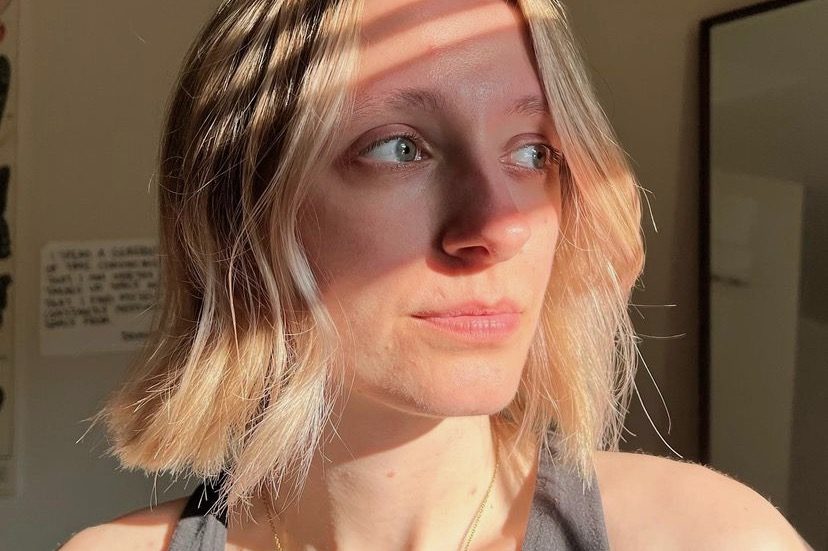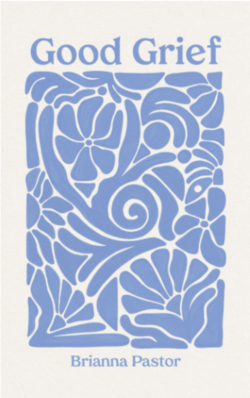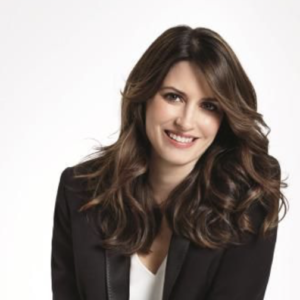Instagram is pregnant—like, nine months pregnant—with wellness quotes. They’re everywhere, and many, many suck. Too many platitudes, not enough insight. Lots of toxic positivity, very little never-thought-of-it-that-way-before expressions.
And then I discovered mental health advocate Brianna Pastor. Pretty much everything she posts makes me think, really think, and feel, and feel seen. The way she comes at this things differently, phrases things inventively, and never avoids the uncomfortable. Exhibit A:
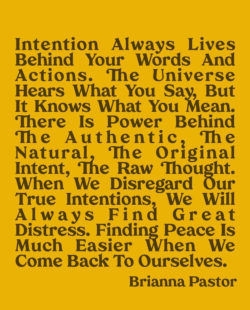
The 30-year-old, in her last year of a bachelor’s degree in psychology at Arizona State University, just published her debut poetry book, Good Grief. “I write for myself and to help others heal in ways that they didn’t know that they needed,” she says. “I believe [that] human beings as a collective are really struggling right now on so many different levels, and they’re learning what it means for healing to not be a linear avenue.”
Indeed. (I am, in this case, exhibit A.) She also spends a lot of her time “trying to educate others on the stigma of mental health.” A needed pursuit, as stigma is one of the biggest blockers to people getting treatment, and a big yes to the way in which Pastor combats stigma, through poetry. The classic myth/fact campaigns commonly trotted out to bust preconceived notions around mental health may, in fact, make it worse, according to a 2022 study published in the journal Stigma and Health. (Big d’oh!)
But back to Pastor. Let’s get to the good stuff: her As to my Qs, as thoughtful, self-aware, and wise as her very best IG posts.

Q: You’ve posted about experiencing trauma and wanting to help people in a way you weren’t. Do you have any mental health issues you’re willing to discuss?
This is probably the most honest I will ever be—oh yes. I have been diagnosed with many things over the years: neurotic personality, C-PTSD, major depressive disorder. I definitely have a lot of trauma that I haven’t fully worked through and it lives in my body, which causes me to be anxious and depressed quite often. That’s actually what I am navigating most of the time—trying to manage those aspects of myself.
I do want to help people in the ways I needed when I was younger. I had no help. I come from a large family with a very long line of generational trauma who used drugs/alcohol to cope with all of it. Most of my family has passed away.
The family that I do have left, well, it’s very complicated. My immediate family is very religious, and I came out as gay at the age of 19.
Q: When you came out, your family didn’t accept you?
They didn’t, because of their religion. It’s not something I tolerate—merely being tolerated by people who are supposed to love me unconditionally.
It hasn’t been an easy path to navigate. I think that not feeling seen or supported for most of my life has brought me here. I could have very easily taken a different path, and I am grateful that I didn’t. If I had been in therapy from a younger age or knew the things I know now, I would be in an even better place. I might have had healthier tools to cope with my emotions. Maybe I wouldn’t have struggled as much as I did.
I want others in the world to know, regardless of their age, that they aren’t alone, and that their struggle is valid, and when all else seems wrong in life, you are capable of making it through.
Q: You mentioned generational trauma. Are you open to elaborating?
There is so much generational trauma that has been passed down, I wouldn’t know where to begin. I come from a long line of “feelings and emotions aren’t real, problems aren’t real, just work hard and shove it all deep down, but drink about it.”
With this way of living comes a lot of depression, anger, rage, misery. I don’t come from a family who pursues being genuinely happy or at ease, so it’s been something I’ve been trying to cultivate for myself going forward.
Q: Do you believe that your mental health diagnoses are due to that trauma?
Oh, absolutely. And that’s never to negate anyone else’s diagnoses. I just feel all of the trauma stuck in my body and know that the conditions of my diagnoses also align with trauma responses. This isn’t to say that I don’t clinically have depression or any other diagnoses I have received, but to validate that trauma has a very large role in my moods and behaviors.
Q: As an adult now, who do you turn to for support?
When I was younger, I didn’t have anybody. So I learned to sleep, and to cry, and to read. Those were my outlets.
Now, I have a family of my own that I am so grateful for. My wife, my chosen family (friends), my cat (her name is Booger), and my parent-in-laws. And who knows, the family might grow soon! Aside from this, I am in two different types of therapy; each therapist has helped me a tremendous amount.
Q: For others who have experienced trauma, what do you want people to know about trauma-related healing?
Above all else, I recommend therapy with a counselor who is trauma-informed. Trauma lives in our bodies. Learning to bring it up and release it and heal from it is vital.
Let me give you an example. When I was 4, I had a near-death experience. I had swallowed a penny that got stuck at the bottom of my throat, and nothing was helping my mother get it out. Eventually, she got it out, and life carried on.
To this day, I cannot swallow large pills, and I suffer from dysphagia (difficulty swallowing) when my stress levels are at an all-time high. At one point, I couldn’t swallow solid food for months because my nervous system was so triggered. I was having panic attacks all day, every day.
I had a lot of work to do with my mental state in therapy to get myself back to a place where I could eat better. It took a long time to work through. But it’s possible. It’s really important to treat ourselves like we would a child (our inner child), especially when we are not in the right headspace. Gentle, compassionate.
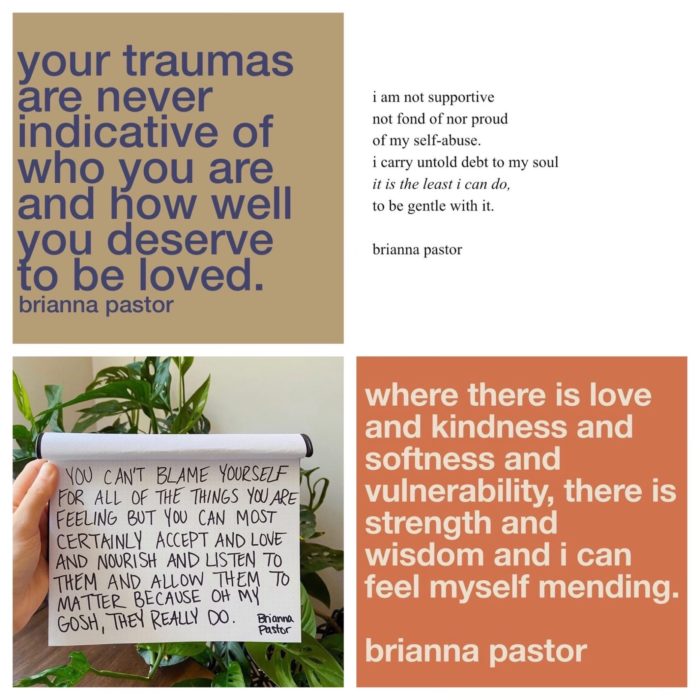
Q: What is your best tip for when someone has a panic attack? Can you get yourself out of one?
I can get myself out of one thanks to my somatic therapist, Sarah. This isn’t to say that I don’t still have panic attacks and that some are harder than others, because they most certainly are. My best tip for panic attacks are two things: Talking to your body while consciously paying attention to your breath—I know it sounds so cliché, but the deep breathing and long exhales really do magical things to you in a panic.
Another tip I use is that when I feel the panic coming on, I immediately get up and distract myself. I grab the nearest water bottle (cold water works best, good for your nervous system) and immediately start drinking. I close my eyes, pay very close attention to the water: how it feels in my mouth, how it feels going down into my stomach, how many seconds I’ve been drinking, taking breaths in between, of course. By the time I finish doing this, I have usually completely forgotten why I began to start panicking.
This distraction is helpful, but it’s also important to remember that your panic is trying to teach you. So honing in to what triggered you and how that made you feel is important when you are devoted to facing that trauma.
Q: You’ve posted that you used to cry every day and now it’s about once a month. What made you cry? What triggered you?
When I look back at my younger self, I don’t know how I made it. I grew up in such a bad mental space that I am genuinely so proud of being here today. I would cry, and not just cry—it would be a four-hour-long breakdown almost every day.
I had a hard time getting out of bed most of the time. At that point in my life, I had nowhere to turn. I had no support system, I had nothing to fall back on. I felt alone. Genuinely alone. So when you are alone in this world and you have nowhere to turn when you need help, everything in life is a trigger. The tightness in the air is a trigger.
The place I am currently at in my life, I welcome the crying. I know crying makes your head hurt, and your eyes burn, and your skin dry—but it is such a release. I always feel so much better after I’ve let everything out. Crying is my way of letting go.
Q: I am such an over-crier. Any tips on how to cry a little bit less?
Don’t judge yourself for being an over-crier. I know, it’s easier said than done. But when you feel these emotions and they come out at a time that you feel may be inconvenient (like, at work), it’s your body telling you that you need to release something. It’s your body telling you that you feel so much of something that you simply cannot contain it all at once. I think that’s kind of beautiful.
If I need to cry at work, I usually go to the bathroom. I don’t particularly care if anyone knows or sees, but I like to have a private space to let it go and then collect myself. I let myself cry, I splash cold water on my face, and try to be as transparent [as I can] with those around me.
Sometimes, letting people around you know that you’re having a difficult day or time can be really helpful. It helps ease the pressure of keeping those emotions bottled up, so we don’t explode or suppress them.
Q: You write about no longer abandoning yourself for others. How do you actually put this into practice?
I used to be an extremely unhealthy person when it came to any type of friendship or relationship. I had never been surrounded by healthy relationships before, so that had really set the tone for me as I grew older. I learned to be a people-pleaser and genuinely thought that I could “save” everyone. I thought that if I couldn’t save them, it was my fault.
At one point, I believed that I was put on this Earth to save people. I really thought that was my soul purpose, because it allowed me to avoid everything wrong in my life. If I could focus on someone else’s problems, I didn’t have to acknowledge mine. I dove deep into other people and never really got to know who I was aside from it. I guess you could say that I abandoned myself every chance I got.
It wasn’t until I began therapy at about 22 or 23 years old that my entire perspective changed. The more I talked, the more I heard myself, and the more I began to learn that I was the problem. That was a really pivotal moment in my journey. From that point forward, I threw myself into learning more, connecting with myself, defining what I wanted from relationships with others.
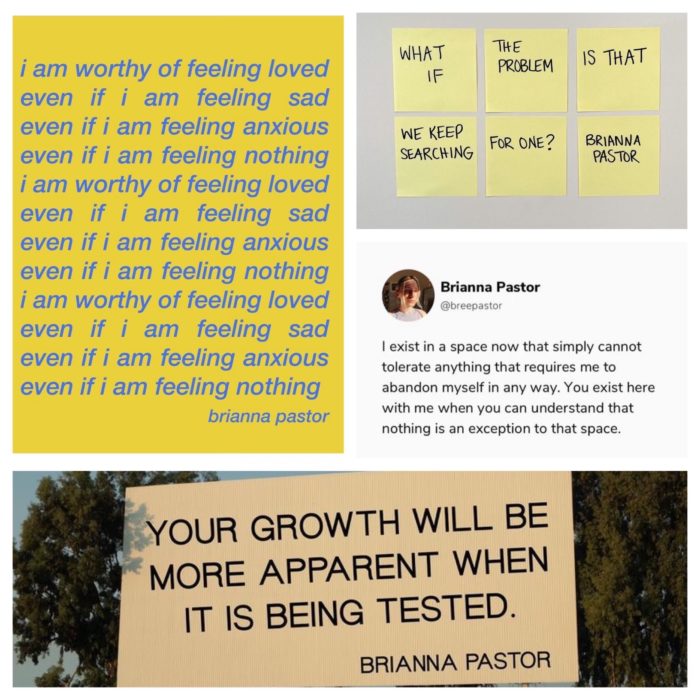
Q: Do people revolt when you no longer abandon yourself for them? How do you stick to your boundaries?
Of course people revolt against it! But that is because they are coming from their own hurt place. That is their language. We can’t control how someone will receive our boundaries, and we have to eventually learn to be okay with that.
I definitely do get anxious about how someone will react when I place boundaries. But then, I remember: This boundary is really, really important to me if I want to have healthy relationships and a more peaceful life. If this person reacts poorly, I can have empathy that they don’t understand, but it doesn’t mean that I have to tolerate it. Sometimes distance or space can really help, too.
Q: Let’s talk about your new book, Good Grief. Tell me everything.
Oh boy! I still can’t believe it. It’s been years…years in the making. My book is a compilation of poems, essays, and prose from the last 10 years of my life. I have been through a lot, and I think it’s important to highlight how transformative being transparent can be. For myself and for readers.
I do include a trigger warning in the beginning of the book because some subject matters can be touchy for others to read—poems about abuse, neglect, mental illness. I do believe that the power of words can alter so much in oneself when we put them to action. When words become a practice, they can really shift perspective.
Q: What inspires you as a writer and poet?
What inspires me most is connection: to people, to our past, to our selves, to our ancestors, to the Earth. The connection between and because of all things. It’s really magnificent when you break everything apart and see how intertwined all aspects of life are.
Q: You’ve got a saying: “I heal deeper when I feel.” Tell me about this, because having “too many” feelings or being “too emotional” is often frowned upon, particularly in the workplace and sometimes even in relationships.
Oh, to feel. At one point in my life, I didn’t understand how anyone could just shove away feelings. I am a highly, highly sensitive person, and I have always felt (what I thought) was too much. My whole life I have heard, You’re too sensitive, Just stop caring, the list goes on. I couldn’t fathom how one could exist in such a complex world and not feel so many different emotions.
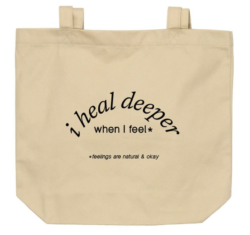 It is, unfortunately, something that is looked down upon, which I think may be taking a turn for the better. I think the more we enforce the “okayness” of feeling, the more others feel welcomed to say, Okay, I feel this. Which leads them to, What am I going to do about it?
It is, unfortunately, something that is looked down upon, which I think may be taking a turn for the better. I think the more we enforce the “okayness” of feeling, the more others feel welcomed to say, Okay, I feel this. Which leads them to, What am I going to do about it?
We start asking questions when we feel. We open doors. How we choose to walk through them is important. I think that for a long, long time, no one asked questions. They felt things and shoved them down and harbored them. That doesn’t get us far.
Q: We can’t get past things without going through them, right?
One of my favorite writers, Kahlil Gibran, writes in The Prophet, “The deeper that sorrow carves into your being, the more joy you can contain.” How profound it is to understand that allowing ourselves to feel the not-so-happy feelings actually makes it more possible to heal from them.
I always say “okay” to my feelings. I allow them to exist, I ask myself what I need in that moment to nurture these feelings, and I have to consciously choose not to identify with them. It’s really quite difficult.
Q: What’s your view on self-love and self-care? When you’re feeling emotionally crappy, how do you care for yourself? Specific songs? Books? Cozy blankets? Skin products? Dumb iPhone apps?
My view of self-love and self-care has transformed so much over the last couple of years. It still changes every day, I think, as I work on learning how to reparent myself.
Q: Wait, “reparenting yourself”—what does this mean exactly?
This means that I know that my mother did what she could with the knowledge she had. My mother had a very rough upbringing, and wasn’t able to be as emotionally present with me when I needed it. Back then, there was no “validating emotions” and “regulating your nervous system.”
I was taught that it was a flaw to be sensitive because no one in my family genuinely knew how to handle or address that. Reparenting is about unlearning everything I have been conditioned to believe about myself, and reteaching myself the way I need to be loved. For myself.
Q: Thank you. Ok, back to self-care. Continue!
A lot of self-care involves self-talk and observing how we speak to ourselves. It’s really easy to get caught up in putting yourself down or not treating yourself kindly. It’s almost easier for us to self-deprecate when we assume we aren’t being productive enough or [that we aren’t] enough in general.
On emotionally crappy days, I make sure that I stick to my normal little routines that I make for myself. I have a skincare routine that I do every morning and night, so even when I feel not “up to par” within, I try to care for myself on the outside. Sometimes it’s my skincare routine, sometimes it’s making myself a healthy smoothie or meal, other times it’s mindlessly scrolling on my phone or watching mindless TV shows. Sometimes I need to just sit in the quiet with a blanket and feel the comfort of that warmth.
My body usually tells me what it needs naturally—it’s more about listening to it and nurturing it during those difficult times. I always recommend having your comfort TV show or movie on in the background of whatever you’re doing. Mine is Friends. Not only does it make me chuckle, but it’s nice having some background noise. For some reason, I think background noise makes me feel more productive or less lonely in the moment.
Q: As a former beauty editor, I must ask: What is your skincare routine?
OOF, GIRL, yas! No one really knows this, but I absolutely love learning about everything skincare. My favorite products right now have to be the Niacinamide + Zinc tincture by The Ordinary, The Cult Classic Cleanser by Tula, and Kiehl’s moisturizer. I use these and have a very strict skincare regimen because I’m so prone to acne and blackheads. Oooh, and my exfoliator! I do that once a week.
Q: You clearly have a way with words. I just found your shirts on Bonfire, and the “Your softness never goes to waste” saying struck me. Where do these phrases come from?
Thank you so, so much! I love that one, too. It’s a gentle reminder that our kindness always makes an impact or that it is always purposeful! A lot of these thoughts and pieces come from lessons I learn from reparenting myself. I journal a lot, and then I reread what I’ve written and highlight what stands out to me. This line in particular was from a journal entry about being kind even when others are not.
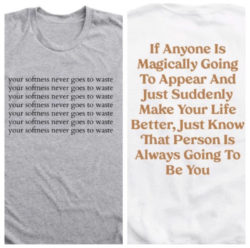
Q: Which phrase-on-shirt is your best-seller?
My best-selling shirt is a crewneck sweater that reads, “If anyone is magically going to appear and just suddenly make your life better, just know that person is always going to be you.” It makes you think. It calls you back into you and your responsibility to yourself.
Q: You’ve done so much already but still write about not “keeping up” with yourself. Personally, I put high expectations on what I need to achieve, and I almost self-shame when I’m not where I think I need to be. What’s a realistic way to deal with that?
I’m so glad you brought this up—it’s actually something that I feel that I’ve genuinely gotten much better at. I, too, set extremely high expectations on what I need to get done. I used to consider myself a failure, or irresponsible, if I didn’t achieve every single thing on my list. I’m a big “list” person; it helps me stay organized.
The issue with making big lists is that we tell our brains that every single thing on that list needs to be done. There’s a really awesome way to re-work this: Make the list. Then, break down the list. What’s a priority for today? What can be done this week, or next week? What is something you’d like to get done but isn’t totally necessary in this moment?
If you think about it, you could sit and add to a list all day if you wanted to. Life is always changing, and each day brings a new task or “thing” that could be done. The trick is to not over-list yourself. Having smaller lists for each day, by priority, is so helpful because it’s less expectation from your daily energy levels.
When we cross things off of our list after they’re finished, we feel good, right? Imagine that list was smaller every day. We’re getting the main things done and not beating ourselves up for what is left unfinished, right?
Geek Out on Our Sources
Stigma as a Barrier to Mental Health Treatment: https://pubmed.ncbi.nlm.nih.gov/24569086/
Myth/Fact Campaigns and Mental Health Stigma: https://doi.org/10.1037/sah0000323
